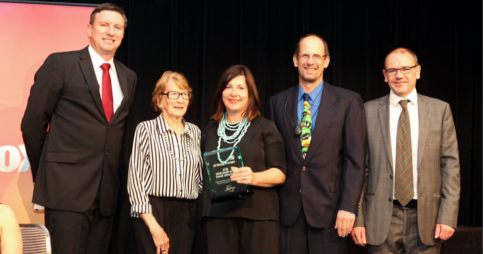Teacher
3D printers to improve classroom access

Increasingly affordable devices can ‘print’ three dimensional objects with computer-based 3D ‘maps’ of everything from chemical compounds, microorganisms, topographical maps, to bodily organs and machine parts.
Top of page
Interview with Kate Kennedy, winner of the Roma Wood OAM Award at the 2014 Captioning Awards
National Curriculum Review and inclusiveness
Ai-Media trials live captioning in UK schools
35 primary school teachers have taken part in the project, which is called the Visible Classroom and is being funded by the Education Endowment Foundation. They have had real-time captions provided by Ai-Media which are streamed onto an electronic whiteboard or tablets during lessons, and afterwards children are able to read the transcripts.
In an earlier trial of the system in Australia, it was found that the captions also benefited non-Deaf students, and allowed teachers to review their professional practice. The UK project is producing similar results.
Top of page
Finding your way around our updated education website content
There are three main categories that provide focused points of reference: accessible media for diverse learners, hearing impairment and deafness and low vision and blindness.
Top of page
NSW Premier’s Teacher Scholarships awarded
Our Education Manager, Anne McGrath also works as an Itinerant Teacher of the Deaf with the Catholic Education Office, Sydney. McGrath was awarded the 2014 Premier's IOOF Centre for Educational and Medical Research Itinerant Support Teacher (Hearing) Scholarship by the Premier, Mike Baird, and the NSW Minister for Education, Adrian Piccoli.
Top of page
CAP THAT!
CAP THAT! is an initiative of Media Access Australia with a dedicated website developed to raise awareness nationally of the need for teachers to turn on captions in the classroom.
Top of page
Database of audio described DVDs
Media Access Australia maintains a database of audio described DVDs. The DVDs listed on the database are entertainment DVDs, but some may have relevance to the classroom.
Top of page
Teacher information (hearing)
Teachers work with a diverse range of student needs, learning styles and a curriculum that presumes the use of audiovisual/multimedia content.
It is vital that teachers who have students who are Deaf or have hearing impairment in their classrooms create an equitable educational environment through the use of inclusive teaching practices.
Top of page




